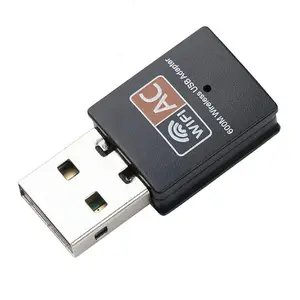(1678 products available)













































































































































































































Wifi adapter for desktop computer is a small device that allows a computer to connect to the internet without cables. It works by converting computer signals into radio waves that can travel through the air. This way, one can use the computer anywhere with the internet, not just next to the router.
There are different kinds of WiFi adapters for desktop computers. Some are called USB adapters and plug into a USB port. Others are internal WiFi cards that go inside the computer and connect to the motherboard.
A WiFi Adapter for a desktop computer connects to a router, which is what provides the internet. It receives WiFi signals from the router and allows a person to use the internets, like watching movies, playing games, or connecting with friends online, without being tangled up in cables.
When buying a WiFi adapter, it is important to make sure it will work with the specific desktop computer being used. Adapters also need to be compatible with the type of WiFi network, like WiFi 5 or WiFi 6. Some adapters can work with both networks.
The main purpose of a WiFi adapter for a desktop PC is to connect the computer to a wireless network. It allows the desktop to communicate with the wireless router and access the internet without needing a physical cable.
When choosing a WiFi adapter for a desktop PC, here are some important features to consider:
Wireless Standards:
Ensure the adapter supports the latest wireless standards such as Wi-Fi 5 (802.11ac) and Wi-Fi 6 (802.11ax) for compatibility and optimal performance.
Dual Band or Tri-Band:
Consider a dual-band or tri-band adapter that supports multiple frequency bands (2.4GHz, 5GHz, etc.) for improved flexibility and performance.
External Antennas:
Look for adapters with external antennas for better range and signal strength compared to internal antennas.
Bluetooth Connectivity:
Some WiFi adapters include Bluetooth functionality for connecting to other Bluetooth devices like speakers, mice, and keyboards.
USB vs. Internal Adapters:
USB adapters offer easy plug-and-play installation, while internal adapters (like PCIe cards) require installation inside the desktop but may offer better performance.
Range and Signal Strength:
Consider the adapter's range and signal strength to ensure reliable connectivity, especially if connecting to a distant router.
Compatibility:
Check the adapter's compatibility with the operating system and desktop PC's hardware to ensure seamless integration.
Security Features:
Look for security features such as WPA3 support for enhanced wireless network security and protection against unauthorized access.
Package Inclusions:
Consider any additional items included with the adapter (e.g., installation CD, antenna, USB extension cable) for a complete setup.
Wi-Fi adapters for desktop computers find applications in various scenarios.
With several types of Wi-Fi adapters available, here's how buyers can choose the right one for their needs:
Q1: Will a WiFi adapter allow a desktop computer to connect to the internet?
A1: Yes. A WiFi adapter enables a desktop computer that does not have built-in WiFi to connect to a wireless network so that it can access the internet.
Q2: Can a WiFi adapter be used to provide internet to multiple computers?
A2: No. Each computer will need its own WiFi adapter to be able to connect to a wireless network.
Q3: Can users still use wired connections along with a WiFi adapter?
A3: Yes. A WiFi adapter does not affect a computer's ability to use wired connections. Users can connect to a router with an Ethernet cable and also access WiFi with the adapter.
Q4: Where is the best location to put a WiFi adapter's antenna?
A4: Locations with open spaces away from walls and furniture are good placements for antennas. They allow signals to pass through more easily.
Q5: What is the purpose of a WiFi adapter for a desktop PC?
A5: A WiFi adapter for a desktop PC connects the computer to a wireless network, allowing it to access the Internet without using a physical cable.